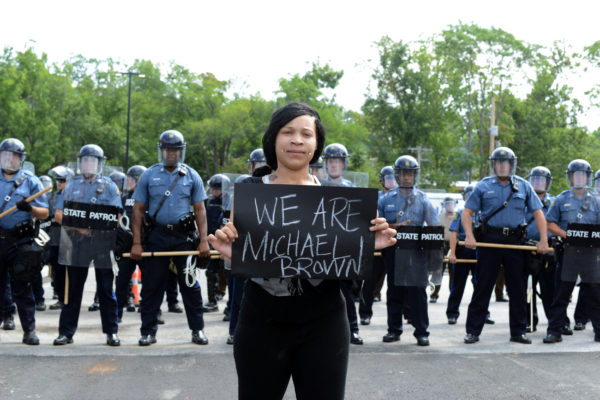“Aisha, always write the truth. The truth will always win.”
~ told to the author of this piece on September 28, 2015 by Sarah Collins Rudolph, survivor of the 16th Street Church Bombing in Birmingham, 1963 and sister of victim Addie Mae Collins
A student-run newspaper at Wesleyan University in Connecticut ran an op-ed by 30 year-old sophomore, Bryan Statscavage, entitled, “Why Black Lives Matter Isn’t What You Think.” Statscavage’s piece challenged the legitimacy of the Black Lives Matter movement by serendipitously linking it to the August on-air shooting of two white reporters by a Black man in Virginia. He then goes further in, coyly attempting to link that shooting, unrelated shootings of police officers and the massacre in Charleston together. He ponders the thought: is such violence possibly “because of Black Lives Matter?”
Wesleyan’s students complained that Statscavage’s opinion piece was another display of how little diversity there was at The Wesleyan Argus and the student paper promptly issued an apology, but not before a petition for the University to defund the paper entirely found its way to the administration. National media sources ran with this aspect of the story because it was a free speech issue for many in this business. As a Connecticut resident, familiar with Wesleyan, something about that perspective didn’t sit right with me—especially not after reading the article in its entirety. While everyone focused on the cry to boycott and the fury over first amendment rights, I started looking more closely at the writer, Bryan Statscavage.
Over the last year, Bryan Statscavage has written a series of articles that really aim to discredit the voraciousness with which Black people are fighting to be acknowledged as living beings in this country. From his position as a white, “moderate conservative,” Statscavage has an imagined reality that the police brutality and terror enacted upon Black bodies is a myth and the examples we have seen over the last few years have been distorted. He admitted in a piece he wrote in December 2014 that the issue and discussion of race makes him uncomfortable enough to “feel as though I’m trapped in a game of minesweeper with no information as to whether I’m about to step on an explosive.”
He writes about privilege, and it is clear that he believes the privilege of white males can be earned by virtually anyone. He doesn’t see how the intersections of race, gender, and financial status have anything to do with life outcomes or his own place and position of privilege from where he casts judgment on those unlike himself. He believes that the evidence in the Mike Brown case—where we usually point to as the true beginning of the Black Lives Matter movement he so criticized— was “dubious” and the case overblown by the media. He believes that only “some” of America’s racism is institutional, that most of it rests on the conscience of individuals. He also blames people who are victims of racism for not coming out of their anonymity to discuss their experiences because it would help him, while ignoring the long history of retribution against Black victims and witnesses, including murder. Furthermore people are supposed to revere his opinion on these issues, not because he has personally experienced them, but because he is a veteran— a protected class of Americans.
The Huffington Post interviewed Statscavage, who said he thought the movement had the potential for “positive change,” but “was just questioning how they are going about it.” That was an outright lie. Statscavage was not trying to find legitimacy in the movement, he was trying to legitimize his own racism and remedy his admitted discomfort with all discourse about the subject. He was seeking attention the best way most like him know how: through the hyperbolic shedding of “white tears.”
How do I know this is true?
A day before the Huffington Post article ran, The College Fix, a “right-minded,” “student reported” publication ran a piece called, “White Student Columnist Tormented By Black Lives Matter Activists for Op-Ed Critical of Movement,” penned by none other than Bryan Statscavage, himself. In the piece he claims that he was targeted for his “informed opinion” by a “disease…spreading rapidly across college campuses nationwide.” The only disease I see here is a megalomania.
In his relatively white sphere, Statscavage has the privilege of being able to decide whether or not he wants to deal with race, in this instance for the purpose of popularity. The Black folks he takes issue with do not have a choice. When you are a person of color, race is the epicenter of everything, America constantly reminds you that you are not white, you are “other” and that your melanin and all the cultural aspects of it are problematic and an existential threat to the endurance of whiteness. Right now, he is riding this wave of power and fame, but how long before others began to look critically at his journalism the way he looked “critically” at Black Lives Matter?
I lead this piece with the quote, a message I received from Sarah Collins Rudolph, a survivor of one of the most horrific acts of terrorism in American history. I decided to include it because writing this article makes me mad. I suspect Statscavage, like a number of conservatives is limited in his knowledge of data because he cannot cite sources for his statistics or information, and often leaves out the truth. If he were forced to do so, would we likely find that all of his points lead back to FOX News? That is why I am writing this, to uncover the truth.
Like many African-Americans, I am tired of having to constantly reiterate the fact that my existence, not just in this country, but my mere existence on this earth is not a crime. Being Black should not be a death sentence and my proudly proclaiming that my Black life, Black skin and Black pride matters is not a threat. People like Statscavage needn’t deceive themselves either into thinking the cry for “All Lives Matter” is a declaration of unity or inclusion— it’s not. It is an antithetical reminder that white lives matter more and those of us who dare to shout that we, too, are worthy of the rights to freedom, liberty and justice should just get over it, and get over ourselves because our Blackness is making them uncomfortable. It is a hostile threat that on the surface appears harmless, but is indeed another form of terror.
The feeling of terror is a soul-shaking, gut-wrenching emotion, then there is the truth— the undeniable, unshakable, verifiable truth.
Statscavage writes about a police ride along where he concludes that “if a predominantly black neighborhood calls 911 more often than other neighborhoods, then the police are going to spend a lot of their time patrolling there.” Unfortunately, he doesn’t mention that the department he shadowed is in a predominately white town. The truth is Connecticut is 81.2 percent white, 11.5 percent Black, and 15 percent Latino; Asians, Native Americans and Native Hawaiian/Pacific Islanders make up 5.1 percent collectively. According to the Hartford Courant, in the last 18 months, statewide, whites got speeding tickets 43 percent of the time while Blacks and Latinos got speeding tickets 56 and 59 percent of the time, respectively.
Statscavage says, “I feel the video showing the death of Eric Garner doesn’t even come close to explaining what really happened that day. It was just a small snippet, and utterly meaningless.”
The truth is Statscavage probably doesn’t know that Connecticut’s Alvin W. Penn Racial Profile Prohibition Act, first enacted in 1999 after a Black state legislator fell victim to racial profiling, was amended this year “to provide that violation of the act is a discriminatory practice, to provide that each traffic stop, including those that do not result in a citation, results in an electronic record on an electronic device in the police vehicle.” This is necessary because those snippets are not meaningless, they provide accountability.
In the aforementioned College Fix article Statscavage writes, “most of the statistics that I’ve read about the police being racist completely meaningless.” While he never never offers a source for these “statistics” he quotes with definitive authority, so-called “meaningless” video captured by a Connecticut priest, Father James Manship, lead to the arrest and conviction of former East Haven police officer Dennis Spaulding for what U.S. Attorney Deirdre Daly said was a repeated “violation of the civil rights of Latino members of the East Haven community.”
To me, it seems Statscavage’s view of racial violence is in the scope of Black and white images of fire hoses and police dogs turned on peaceful protesters. This view is one dimensional, in that they see this racial violence as something that happened and that those people, once the book is closed or the image gone are part of a fairy tale, a fairy tale that ends with a 15 second clip of Martin Luther King saying, “I Have A Dream,” just to make the bad images go away. The only present “racism” he can see is what he believes was directed at him by his fellow students for calling him out on his bigotry. In his mind, they are the true racists, not him.
Statscavage refuses to see that many of those people we ruminate on in history books are still very much alive and live with the memories of the terror enacted upon them. For example, Sarah Collins Rudolph, for whom I speak this truth now, still bears the physical scars and ongoing medical issues due to injuries she sustained from the 1963 bombing, she also still bears the psychological scars. Sarah still has nightmares 52 years later, she can still hear the sound of the bomb. And she still misses her sister.
She is not alone.
How can we grant exception to those who survived the September 11 attack to never forget the trauma of that day, but expect that something equally traumatic though not as recent to have left the minds and memories of those who survived? How does one like Statscavage deny that truth? The answer is that he does it with ignorance, pure and simple.



